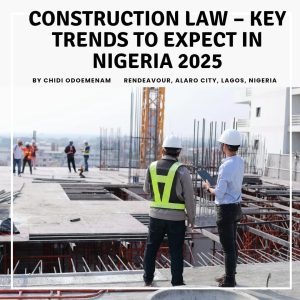THE PREVENTION PRINCIPLE AND THE
RISK OF EMPLOYER-CAUSED DELAY UNDER THE 2017 FIDIC SUITE OF CONTRACTS
NGO-MARTINS OKONMAH*
Senior Associate, Aluko & Oyebode
INTRODUCTION
Since the publication by the Fédération Internationale des Ingénieurs Conseils (“FIDIC”) of the 2017 Edition of the FIDIC Suite of Contracts, there have been discussions about its key features and how they differ from those of the 1999 FIDIC Suite of Contracts.1 Many commentators have pointed out the distinction between the notification and claims management provisions under the 1999 and 2017 FIDIC Suite of Contracts.2 However, these provisions have not been analysed from the perspective of the risk of Employer-caused delays. This article analyses the claims provisions in the 2017 FIDIC suites of Contracts from the perspective of the allocation and transfer of the risk of Employer- caused delays. The analysis will compare the distinct approach adopted in 1999 and 2017 FIDIC Suites of Contracts highlighting the issues, implications and proposing recommendations in relation to the way the discretionary power accorded the Engineer under sub-clause 20.2.5 of the 2017 FIDIC Form should be applied in the allocation of Employer-caused risk between the parties.
AN OVERVIEW OF THE PREVENTION PRINCIPLE
A discussion of the prevention principle is relevant because its operation or implication operates to reallocate risk and determine liability for delays resulting from Employer’s default. This Section provides an overview of the prevention principle under English law (and indeed most common law countries) and its effect on the allocation of risk of Employer-caused delay.
The “prevention principle” operates to render inapplicable a liquidated damages clause where the Employer or his agents causes completion of the works to be delayed, leaving the Employer to prove his damages at large, and the Contractor obliged only to complete the works within a reasonable time.3 It is founded upon the broader notion that a party cannot enforce a contractual obligation, if that party has prevented the other party from complying with the obligation. Lord Denning, in Amalgamated Building Contractors Ltd v Waltham Holy Cross Urban District Council,4 said: “… the building owner cannot insist on a condition if it is his own fault that the condition has not been fulfilled.” Brooking J in SMK Cabinets v Hili Modern Electrics Pty Ltd5 described the prevention principle as being “grounded upon considerations of fairness and reasonableness”.
The prevention principle does not depend upon a breach of contract by the Employer and applies to actions by the Employer which are permitted by contract but nevertheless impedes the progress of works.6 It is a principle that has been applied by the courts where, for example, the Employer
(i) had failed to give possession of the site;7 (ii) had failed to provide plans at proper time;8 (iii) had interfered improperly through its agent in the carrying out of the works;9 (iv) had ordered extras which necessarily delay the works;10 (v) had failed to deliver components it was bound to provide;11 or (vi) had delayed in giving essential instructions.12 In these cases, the Contractors were required to complete the work within reasonable time as determined by the court as time was said to be set “at large”.13
Even if the Contractor would have been unable to complete on time in the absence of an act of prevention by the Employer, the prevention principle will render the liquidated damages clause unenforceable unless any of the exceptions to the principle applies. The court will not seek to apportion delay in determining the enforceability of the liquidated damages clause.14 However, if the prevention occurs after the contractual completion date, when the Contractor is already in delay, the Employer will recover liquidated damages up to the date of prevention and may be able to do so.
This article was first published in the International Construction Law Review Volume 38, Part 2, April 2021, http://i-law.com/ilaw/
Endnotes
* Ngo-Martins is a senior associate in the law firm of Aluko & Oyebode, Nigeria and coordinates the firm’s construction and engineering practice. He holds an MSc. Construction Law and Dispute Resolution from King’s College London and has built specific expertise in the fields of construction law and arbitration. He has prior work experience acting as arbitrator and counsel in both domestic and international arbitration administered under the ICC Rules, with seats in Switzerland, London, Miami, Florida and Nigeria. He is the Founder and Executive Director of Africa Construction Law and sits on the Board of Directors of Africa Arbitration Academy.
1 See Glover, J and Hughes, S, Understanding the FIDIC Red and Yellow Books (3rd Edition, Sweet & Maxwell, 2018), 497–521; Chaplin, R and Studholme, A, “Construction Law Guide to: FIDIC”, [2018] 29(6) Construction Law Journal 14.
2 Glover et. al., (fn 1) 515; Chaplin et. al. (fn 1).
3 Smith, G, “Prevention Principle and Condition Precedent: Recent Australian Developments”, [2002] ICLR 20.
4 (CA) [1952] 2 All ER 452 at 455, applying Roberts v Bury Improvements Commissioners (Court of Exchequer) [1870] LR 5 CP 310.
5 [1984] VR 391.
6 Multiplex Construction (UK) Ltd v Honeywell Control Systems Ltd (QBD (TCC)) [2007] EWHC 447 (TCC); [2007] BLR 195; 111 Con LR 78.
7 Holme v Guppy (Court of Exchequer) [1838] 3 M & W 387; [1838] EngR 133; (1838) 150 ER 1195;
Rapid Building Group Ltd v Ealing Family Housing Association Ltd (CA) (1985) 29 BLR 5.
8 Roberts v Bury Improvements Commissioners (Court of Exchequer) [1870] LR 5 CP 310.
9 Russell v Sa da Bandeira (1862) 13 CB (NS) 149.
10 Dodd v Churton (CA) [1897] 1 QB 562 and Astilleros Canarios SA v Cape Hatteras Shipping Co Inc and Hammerton Shipping Co SA (The Cape Hatteras) (QBD (Comm)) [1982] 1 Lloyd’s Rep 518 at 526.
11 Perini Pacific Ltd v Greater Vancouver Sewerage and Drainage District (BCCA) [1966] 57 DLR (2d) 307.
12 Peak Construction (Liverpool) Ltd v McKinney Foundations Ltd (CA) (1976) 1 BLR 111.
13 Furst, S and Ramsey, V, Keating On Construction Contracts (10th Edition, Sweet Maxwell 2016), 8-014.
14 Rapid Building Group Ltd v Ealing Family Housing Association Ltd (CA) (1985) 29 BLR 5.


















